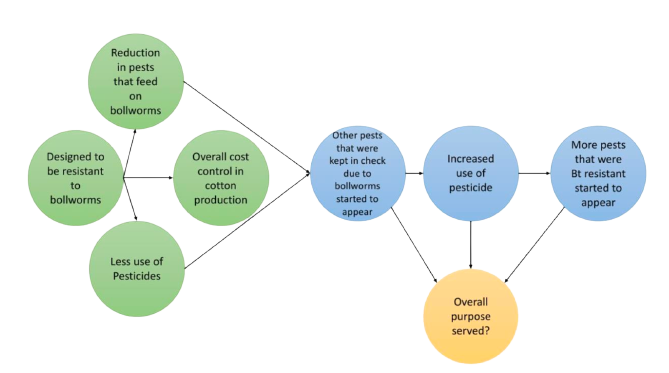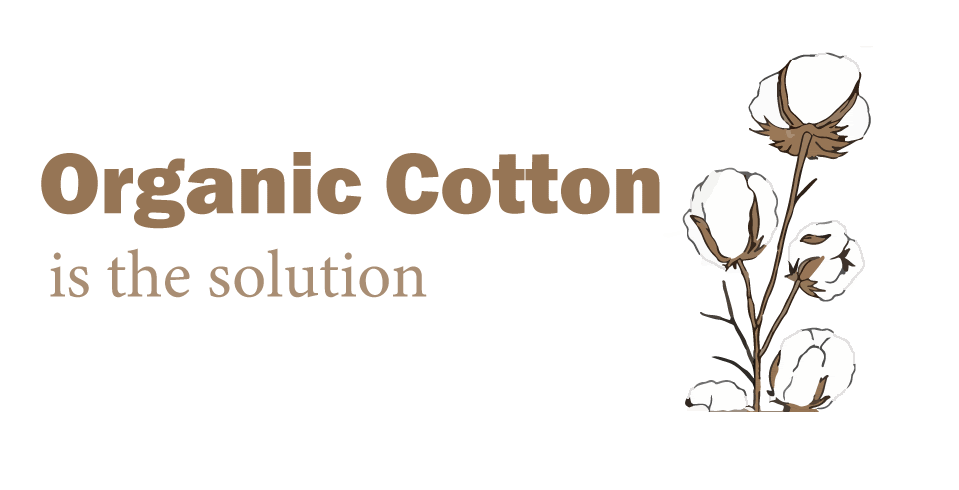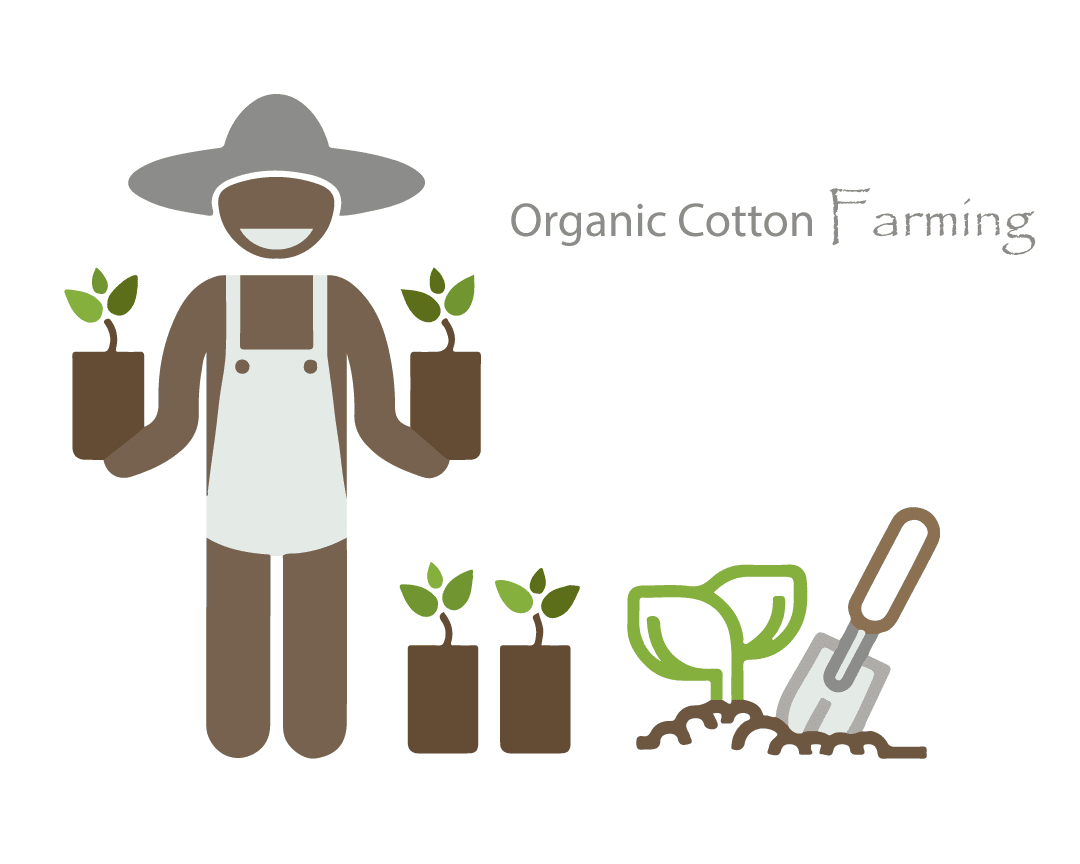
Close


With growing concerns regarding climate change, global warming and the numerous health risks associated with chemicals, organic products are becoming increasingly popular. Conscious consumers have also propelled the fashion industry to align with eco-fashion. With natural fabrics gaining momentum in the fashion industry, cotton continues to be the most popular choice as a natural fibre. While this is great news, the rampant greenwashing bars consumers from making an informed choice. Are just cotton garments enough to become sustainable? Read on to find out.
Cotton is a natural fiber, which makes it less destructive to the environment than synthetic fabrics. But is that enough for it to be sustainable?
No.
While natural fabrics are biodegradable for them to be a sustainable commodity, it is important to know how they were cultivated and how were they processed before becoming a garment.
Cotton is the only non-food crop that is cultivated on a very large scale in the world. This means there are millions of acres around the globe cultivating cotton. Hence it has an enormous environmental impact. Cotton seeds are of two types.
Over 80% of the cotton cultivated worldwide is from hybrid seeds.
Hybrid seeds as you can guess from the name are hybrids that are formulated in labs. This means they are genetically modified to get favourable traits from various varieties.
While all of this is great, the problem with GMO seeds is that initially all is well but over the years, there are more disadvantages than there are advantages of a hybrid crop.
Let’s take the example of a very popular hybrid Bt Cotton variety-

It was designed to be resistant to bollworms, a major pest that affects cotton. Reduction in bollworms would result in reduction in pests that feed on bollworms. This would help reduce the overall use of pesticides and in turn result in the overall cost reduction.
1. Eventually other pests that were in check due to bollworms, became dominant and disturbed the crop. 2. More Bt resistant pests started to attack the crop.
3. This led to the increased use of pesticide, which defeated the whole purpose of Bt cotton.
What this conveys is that the design of hybrid seeds targets only one problem without taking into consideration the other aspects of the ecosystem. Nature is not uni-directional. One effect may be the result of multiple causes. But by the time the effects are visible, there is not left much to salvage.
The same has happened with cotton. Farmers are in a loop now, the soil is ruined because of decades of use of chemicals so they cannot go for natural farming and they still need to harvest crops so Bt cotton is still popular.

Organic cotton is cultivated from non-GMO seeds. Additionally, the method of organic farming prohibits the use of artificial insecticides, pesticides or chemicals.
The organic cotton crop is mostly rain-fed ( rains are unpredictable now due to climate change so irrigation has become a necessity) and because it has been cultivated for centuries in the climate, it is tolerant to the climate and is resistant to pests as well.
With the increase in climate change and global warming, each step taken by us matters, be it even by transforming our cotton closet into a fabric organic cotton closet.
We are living in a time, where each step will either lead to an immense increase in global warming or will lead to the protection of Mother Earth. So why not make our actions count and take a step by protecting our nature by switching to organic clothing?!

You would think that if organic cotton fabrics have so many benefits it would be super popular. Sadly, that’s not the case. While organic cotton farming is beneficial to everyone involved including humans and the earth, it is difficult to practice because-
If at all someone brave enough takes up the task to get back to methods that have proved effective over thousands of years, i.e. the use of indigenous seeds, the path is a difficult one.
Lower yields are not acceptable because the demand for cotton is very high. And with the continuous use of chemicals, the soil quality is rarely good to grow organic crops. While soil quality can improve over time, practising organic farming over severely damaged soil is bound to fail without first enriching the soil. Farmers in developing countries like ours cannot afford to invest that much time due to economic as well as social reasons.
Even though hybrid cotton continues to be cultivated widely, soil under organic cotton cultivation is also increasing which is a good sign for the earth.
Now, with global warming and climate crisis looming over, it is slowly being realized that organic cotton production is a much cleaner and greener alternative.
It is impossible to know if the garment is made from organic cotton simply by touch and feel. Hence as consumers, we have to rely on what brands disclose about their fabrics.
There are always labels that are honest about what goes into their products and there are some that are not as honest as we would like them to be. So labels on clothes do not completely reveal what kind of cotton was used or if the product is 100% cotton. But there are international standards that help consumers choose the right products. We just need to be aware of how to find those brands.
Organizations like GOTS ( Global Organic Textile Standard) have a thorough the procedure to certify a fabric as organic cotton. While the growing and harvesting process are definitely important, this organization also takes into account the working conditions of employees. Organizations like these attempt to get a fair price for fabrics for the manufacturers while keeping in mind that consumers get genuine products.
All in all, organic cotton fabrics are definitely better than regular cotton. The benefits are drawn by you as a consumer and also by the farmers and the earth as well. And I think with the growing demand of organic fabrics, the prices will also become competitive and hopefully make organic fabrics more readily available.
If natural fabrics are your thing then I think you should look no further. Suvetah is GOTS certified sustainable fabric manufacturer of Organic Cotton Fabric, Linen Fabric and Hemp Fabric. We have a variety of other natural fabrics as well and for anyone looking to get even more sustainable, we even offer services of naturally dyeing fabrics!